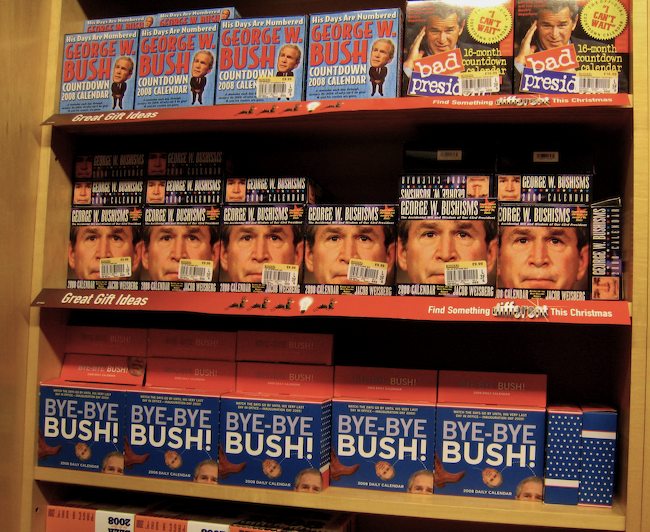
The best-selling calendar section in Borders this morning.


The best-selling calendar section in Borders this morning.

Not quite sharp enough. Bah!

Photographed early on Saturday morning, on the back road to Ely.
This morning’s Observer column…
Visitors to ThinkSecret.com, a well-known site which publishes rumours and gossip about forthcoming Apple products, found an intriguing notice on the front page last Thursday.
‘Apple and ThinkSecret have settled their lawsuit, reaching an agreement that results in a positive solution for both sides,’ it announced. ‘As part of the confidential settlement, no sources were revealed and ThinkSecret will no longer be published. Nick Ciarelli, ThinkSecret’s publisher, said: “I’m pleased to have reached this amicable settlement, and will now be able to move forward with my college studies and broader journalistic pursuits.”‘
Let’s unpack that…
Hmmm… Interesting paper by G. Orosz and G. Stépán in the September 08, 2006 issue of Proceedings of the Royal Society of London A on “Subcritical Hopf bifurcations in a car-following model with reaction-time delay” which purports to show how major delays occur on motorways with no apparent cause.
Important stuff this, and no mistake. I mean to say, how many times have you been baffled when you finally reach the end of a tail-back only to find no visible cause for the delay? Now, a team of mathematicians has developed a mathematical model to show the impact of unexpected events such as a lorry pulling out of its lane on a dual carriageway. Their model reveals that, by slowing down below a critical speed when reacting to such an event, a driver would force the car behind to slow down further and the next car back to reduce its speed further still. The result of this is that several miles back, cars would finally grind to a halt, with drivers oblivious to the reason for their delay. The model predicts that this is a very typical scenario on a busy highway (above 10–15 vehicles per km). The jam moves backwards through the traffic creating a so-called ‘backward travelling wave’, which drivers may encounter many miles upstream, several minutes after it was triggered.
Quite so. I thought you’d like a peek at the model which produces these interesting findings.

Obvious, when you think about it.
… it can buy you a yacht.

This is Microsoft co-founder Paul Allen’s boat, trying to dock at Antibes. I first heard about it on Stephen Heppell’s phone blog, and followed the link to the pdf brochure. It’s called Octopus and is allegedly the world’s largest privately-owned yacht. It cost Allen over US$200 million and has a permanent crew of 60, including several former Navy Seals.
The vessel has two helicopters, seven boats, a 10 man submarine and a remote controlled vehicle for crawling on the Ocean floor. The submarine has the capacity to sleep eight for up to two weeks underwater. (Er, why would anyone want to sleep for eight weeks underwater?)
According to the brochure, on average, owners must spend a minimum of 10 percent of the purchase price every year to keep these yachts in good working condition and cover crew salaries. Therefore “Octopus” requires a US$20 million annual budget.
I’m sure that all those dedicated Windows users will be delighted to see that their license fees are being so well spent. Here, for example, is the ‘Starboard Bar and Spa’.

So tasteful, don’t you think? And how thoughtful to include a hot tub.
From Quentin’s blog:
Philosophy is questions that may never be answered. Religion is answers that may never be questioned.
He got it from Dan Dennett.
John Lanchester has a lovely piece in the latest London Review of Books about Cityphilia — worship of the City of London and its pernicious effects on London in particular.
This uncritical and uninformed governmental Cityphilia, he writes,
received its biggest shock in decades this autumn, with the near collapse of Britain’s fifth largest mortgage lender, Northern Rock. Britain’s first genuine bank run in more than a hundred years shone a light in many places where the sun doesn’t routinely shine, and one of the first things to be brought into question was the ways banks work. As I’ve already said, my father was a banker, and I grew up hearing about that mythical beast, the bank run. It was often spoken of but rarely seen in the wild. Bankers are said to dread a bank run, but my dad talked about them with a certain black humour. They were always a sign that somebody had fucked up, big-time. They can also be a sign that something in the financial system is fundamentally wrong. The question hanging around in the residue of the Rock’s near implosion is which type of bank run this was – a fuck-up, or a harbinger of meltdown?
It’s a great piece. Here’s the opening para:
At the point when we bought our house in 1996, average house prices in the UK, adjusted for inflation, were some way below the levels they’d hit in the late 1980s bubble. Clapham was then still a place people moved to when they had families and wanted larger and cheaper houses, and were willing to move south of the river to get them. When house prices began to go up, this area began to be colonised by bankers and City types. We were the last non-City people to move into the street where we live – the last of the aborigines. These days, as houses become an ever more critical capital asset, there is a constant va-et-vient of renovation, a non-stop turmoil of attics being done, basements being dug out, skips being filled, scaffolding put up and everything knockable being knocked through. In a street two hundred metres long, there is at the moment one skip, three sets of scaffolding, two basement conversions, a loft conversion and two full renovations. Most of this activity is generated by the City people, since we aborigines for the most part tend not to move; we’re all still here. But the bankers move all the time, doing up and selling on houses, usually to move to the Old Rectory in Shaghampton, Wiltshire, with the husband spending three or more nights in town until the inevitable happens. (‘Half of my business is “The Old Rectory, Wiltshire”,’ a cheerful divorce lawyer once told me.)
Worth reading in full. Can’t find Shaghampton on Google Maps, though. Pity. But a Google search for it already returns one hit — the LRB article.

Intel photograph.
From Technology Review…
Since it found its way out of the lab in the late 1990s, flash memory has revolutionized consumer electronics. Because flash-memory chips are smaller, more rugged, and more energy efficient than magnetic hard disks, they have been the ideal replacement for hard drives in handheld devices such as MP3 players, and even in some high-end laptops. Flash is a solid-state memory technology, which means that it has no moving parts and stores data using silicon transistors like those found in microprocessor chips. Because it uses microprocessor technology, it also roughly follows Moore’s Law, the prediction that the number of transistors on a chip doubles about every two years. For processors, this means that they get faster, but for flash-memory chips, it means that data storage doubles. And the market has responded to flash’s burgeoning capacity: in 1999, the flash-memory market was nonexistent, but in 2007, it amounts to $15.2 billion.
At a press event, Don Larson, the marketing manager of Nand products at Intel, showed off the new chip. Called the Z-P140, it’s about the size of a thumbnail and weighs less than a drop of water. It currently comes in two- and four-gigabyte versions, which are available to manufacturers for use in handheld devices. The first products featuring the new chips will be available in January.
Since the new solid-state drive has standard control electronics built in, it can be combined with up to three other Intel chips that don’t have controllers, for a maximum of 16 gigabytes of storage, says Troy Winslow, flash marketing manager at Intel. While that may not seem like a lot compared with the 160-gigabyte hard drives in desktop computers, Larson pointed out that two gigabytes is enough to run some operating systems, such as Linux, along with software applications…
Seems daft to call it a ‘hard drive’ though.
Another stone thrown into our media pond. OhMyNews is coming to a screen near your desktop…
Oh Yeon Ho, the pioneering South Korean journalist and owner of the world’s largest ‘citizen journalist’ media website, plans to launch his website OhmyNews.com in Europe.
The site, which famously swung the outcome of the 2002 South Korean presidential election, publishes content written by almost 50,000 members of public and boasts up to 600,000 daily readers.
Mr Ho said: “I hope I can keep introducing our model to other countries including Europe, North America and hopefully North Korea in the future. Why not?
“Actually, we are in talks with a European partner to launch an OhmyNews site in Europe.”